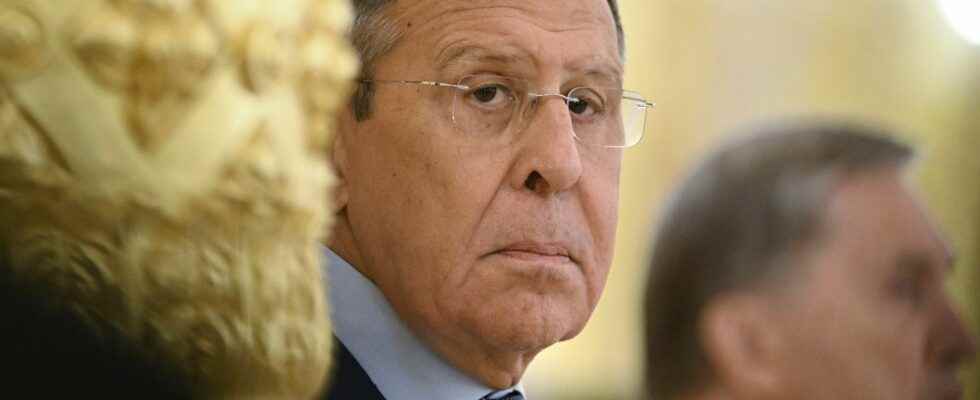This January 18, 2023, in front of an audience of Russian journalists and correspondents gathered in the Tass press agency, in Moscow, Sergei Lavrov, his face closed, recites yet another diatribe against Ukraine and the West: “Like Hitler who united the whole of Europe against the Soviet Union, the United States has organized a coalition of almost all Europeans, asserts the Russian Foreign Minister, and is waging a war through Ukraine against our countries with the same goal: the final solution to the Russian problem.”
The sequence, filmed, quickly became viral on the Net, where it provoked a mixture of indignation and consternation. However, the man is accustomed to the fact. For months now, Sergei Viktorovitch Lavrov has been increasing his verbal outbursts against Western enemies, often lapsing into an unhealthy one-upmanship. “Hitler had Jewish blood […] The most ardent anti-Semites are generally Jews,” he asserted on May 2. Faced with the outcry, Vladimir Putin had to apologize in person to Israel.
How could the head of Russian diplomacy have fallen so low, he who, two years ago, aroused a certain admiration in European chancelleries? “He is someone who has a huge capacity for work, good living and joking”, estimates a Western source, who has often crossed paths with him. Also in Russia, the character is popular. “He can speak as equals with any expert on any issue: Syria, Libya… he knows every town, every armed group. He is a great professional”, reports Andreï Kortunov, director of the Russian Foreign Affairs Council, a think tank reputed to be close to the government.
Lavrov, star diplomat
In 2021, Russian diplomacy is in the firmament. In the Middle East, it is at the center of the game and speaks to Syrians, Turks, Kurds, Iranians and Israelis alike. In Africa, Moscow is advancing its pawns, deepening its cooperation with China and seducing with its vision of a post-Western “multipolar world”. Sergei Lavrov embodies this effective and conquering diplomacy. Alternately jovial or sinister, his face is familiar from Damascus to Budapest, like his attention-grabbing bass voice. Lavrov, star diplomat.
At least until the entry of Russian tanks into Ukraine on February 24, 2022. Lavrov becomes the symbol of this Russia which flouts the rights of peoples. At the UN, many representatives are boycotting his interventions, while on the ground, the Russian army is multiplying its setbacks. China, yet a “limitless” friend of Russia, stands aside. Even in its backyard, Russia is in difficulty. In the Caucasus, it no longer plays its role of arbiter in the Nagorno-Karabakh conflict. In Central Asia, Moscow is losing its influence, especially in Kazakhstan. “The former Soviet republics clearly want to distance themselves from Russia, observes Georgi Kounadze, former Russian Deputy Foreign Minister. This is the price to pay for the military adventure in Ukraine.”
Today, Russian diplomacy is only a shadow of itself. The war has brought to light the weaknesses of an institution for which, obviously, the Kremlin has little regard. “There were probably only three or four people in Vladimir Putin’s entourage who knew what was going to happen on February 24, says Arnaud Dubien, director of the Franco-Russian Observatory. Neither Lavrov nor his Deputy Minister Riabkov, who was leading the negotiations with the Americans, was not part of it. The Ministry of Foreign Affairs has no influence on decision-making in international policy.” As Putin gave up trying to find common ground with the West, his foreign ministry became one of many “messengers” of his propaganda for internal use. It is by this yardstick that we must interpret his incendiary declarations and his outbursts.
Lavrov, a tired diplomat
The sociology and culture of the Russian Foreign Ministry are also no stranger to its weakening. “It’s a very Soviet institution, very vertical and fossilized, with a capacity for initiative close to zero. Its recruitment is very uniform, with very few women. And there is a generational gap, a great lack of diplomats from ‘a good level between 50 and 60 years old, hence the temptation to keep sixty-somethings in their jobs,’ says Arnaud Dubien.
Sergei Lavrov himself is 72 years old.. His outspokenness, once appreciated, has become vulgar. Investigations by supporters of Alexeï Navalny attribute to him a hidden family that he maintains on the funds of his ministry, tarnishing his image a little more. Tired, he wanted to resign in 2016, but Putin refused to part with him. “I think Lavrov regrets it, slips us a well-informed source. He would probably prefer not to have to deal with what is happening now and which is destroying what he has patiently built for years.”
